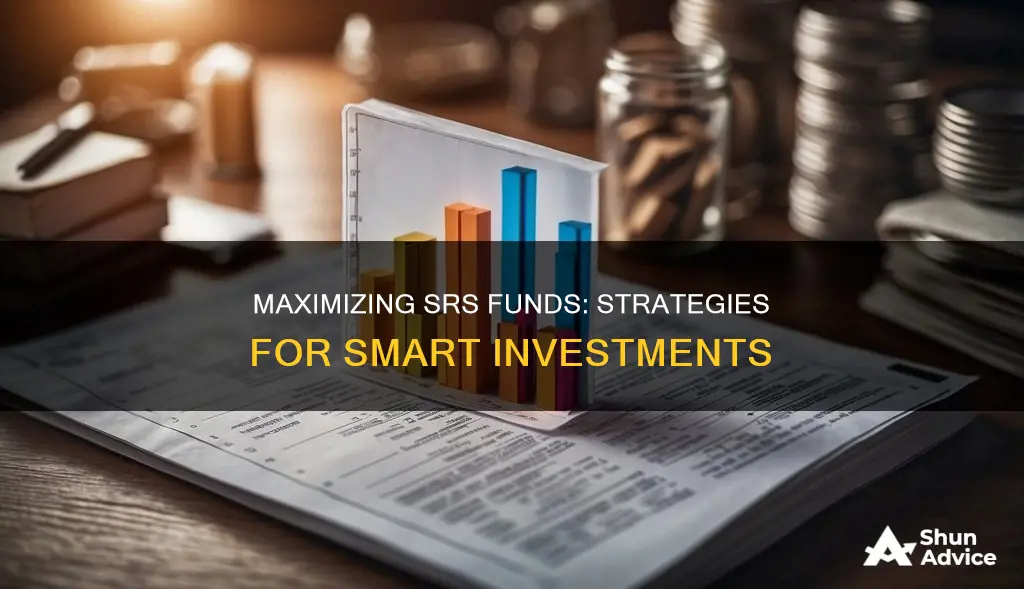
The Supplementary Retirement Scheme (SRS) is a government scheme that helps individuals save for retirement while offering tax benefits. SRS contributions are eligible for tax relief the following year, with a personal income tax relief cap of $80,000. The maximum yearly contribution for Singaporeans and permanent residents is $15,300, while foreigners are allowed up to $35,700. SRS funds can be used to purchase various investment instruments, such as endowment insurance plans, unit trusts, stocks, bonds, and exchange-traded funds (ETFs). It is recommended to take a long-term approach to SRS investments to maximise returns and achieve a comfortable retirement.
| Characteristics | Values |
|---|---|
| What is SRS? | Supplementary Retirement Scheme |
| Who is it for? | Singapore citizens, PRs, and foreigners working in Singapore |
| What is it for? | Retirement savings, tax savings |
| Contribution limit | $15,300 for Singaporeans and PRs; $35,700 for foreigners |
| Tax relief | Dollar-for-dollar tax relief on contributions |
| Investment options | Bonds, single-premium retirement plans, short-term endowment plans, index funds, ETFs, real estate investment trusts, stocks, unit trusts, annuities, fixed deposits, government securities, insurance plans |
| Early withdrawal penalty | 5% penalty for early withdrawal; 100% of the amount withdrawn is taxed |
| Where to open an account | DBS, UOB, OCBC |
What You'll Learn

Endowment Insurance Plans
Endowment plans allow you to grow your SRS funds over a fixed period, typically three years, with a guaranteed interest rate on maturity. This means that you will receive a higher sum than you invested once the plan reaches maturity.
Where can I purchase endowment insurance plans?
You can purchase endowment insurance plans at any OCBC Bank branch.
Endowment plans offer a guaranteed return, usually with a basic level of insurance coverage. They are also protected by the Policy Owners' Protection Scheme, administered by the Singapore Deposit Insurance Corporation (SDIC). This means that, in the event that the insurer fails, your policy will be transferred to another insurer, or the SDIC may take over and cover existing policies (with caps).
Endowment plans typically have locked-in periods, and it is usually not advisable to surrender the plan before maturity, as you may receive less than you invested. Additionally, endowment plans may have lower returns than other investment options, and there is no flexibility to change the payout structure once it is set.
One plan to consider is the GREATLife Endowment Insurance II, which offers the flexibility to make partial or full withdrawals to meet your needs. However, SRS funds can only be used to purchase five-year prepayment plans.
Smart Strategies for Investing in Low-Cost Mutual Funds
You may want to see also

Unit Trusts
When investing in unit trusts with SRS funds, individuals have the option to choose from a diverse range of funds. These include global equities, fixed income, alternative assets, Exchange-Traded Funds (ETFs), Asian equities, and Asian fixed-income instruments.
- Fidelity Global Multi-Asset Income Fund: This fund invests in a range of asset classes, including global equities, fixed income, and alternative investments.
- Lion-OCBC Global Core Fund: This fund offers exposure to a diverse portfolio of ETFs.
- Schroder Asian Income Fund: This fund provides access to a mix of Asian equities and fixed-income instruments.
It is important to note that the list of available unit trusts for SRS investment is extensive, with over 70 options offered by OCBC alone.
When investing in unit trusts, it is essential to carefully consider your investment goals, risk tolerance, and time horizon. Unit trusts can provide a well-diversified investment option, but it is important to assess the specific risks associated with each fund before investing.
Galaxy Digital Assets Fund: An Investment Guide
You may want to see also

Singapore Government Securities
There are two main types of SGS:
Treasury Bills (T-bills)
T-bills are short-term bonds issued at a discount to their face value. The interest is the difference between the purchase price and the face value, which is received at maturity—either 6 months or 1 year after issuance. T-bills have a minimum investment amount of $1,000 and are AAA credit-rated. The yield is determined through an auction process, and the exact yield is unknown at the time of subscription. T-bills can be traded in the secondary market, but prices may vary based on market conditions.
SGS Bonds
SGS Bonds differ from T-bills in that they have longer maturity periods, ranging from 2 to 50 years, and they pay a fixed coupon every six months. This regular interest payment makes them attractive to investors seeking a steady income stream over a longer term.
Both T-bills and SGS Bonds are secure ways to diversify your investment portfolio, offering different maturities and interest payment structures to suit various investment strategies and goals.
Mutual Fund Roth IRA: Best Investment Options
You may want to see also

Structured Deposits
The return of a structured deposit is usually dependent on the performance of an underlying financial instrument. The principal amount of the investment will be returned to you if you hold the investment to maturity, and the bank remains solvent. Structured deposits are a good way to earn potentially higher returns compared to traditional fixed deposits, though payouts may vary.
For example, OCBC offers a 1.5-year Equity-Linked Structured Deposit that gives a fixed return of 2.00% with a bonus coupon of 4.00% upon the fulfilment of the bonus conditions.
Hedge Fund Managers: Where to Find Their Investment Theses
You may want to see also

Time Deposits
Singapore dollar options can offer interest rates as high as 3.5% per annum for a 3-month tenure, while a 6-month US dollar fixed deposit rate can be up to 5% per annum. However, it is important to note that some of these rates may be promotional and may not apply to SRS savings. Additionally, foreign currency risk should be considered when choosing between Singapore dollar and US dollar fixed deposit rates.
Compared to other investment options, time deposits offer stable interest rates but have limited flexibility and potential for reinvestment risk. They are suitable for those who want a secure investment with higher returns than a regular savings account.
Before investing your SRS funds in time deposits, be sure to compare the rates offered by different banks and financial institutions to get the best returns. Additionally, consider the tenure and interest rate that best suit your investment goals and risk tolerance.
Strategic Development: Unlocking Investment Opportunities
You may want to see also
Frequently asked questions
The Supplementary Retirement Scheme (SRS) is a government scheme that helps you save for retirement while reducing your tax expenses.
You can get a dollar-for-dollar tax relief on your SRS contributions, which reduces your chargeable income. For example, if your taxable income is S$100,000 and you contribute S$10,000 to your SRS account, you will only pay tax on S$90,000.
The yearly contribution limit for Singaporeans and Permanent Residents is S$15,300. For foreigners, the limit is higher at S$35,700 as they do not enjoy tax relief on their CPF contributions.
There are various investment options for SRS funds, including Singapore Government Securities, Exchange-Traded Funds (ETFs), Unit Trusts, Real Estate Investment Trusts (REITs), and stocks.
Investing your SRS funds can potentially provide higher returns compared to leaving them idle in the account, which typically earns a low interest rate of 0.05% per annum. By investing, you can potentially grow your retirement savings and take advantage of non-taxable investment gains.







